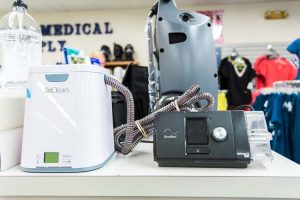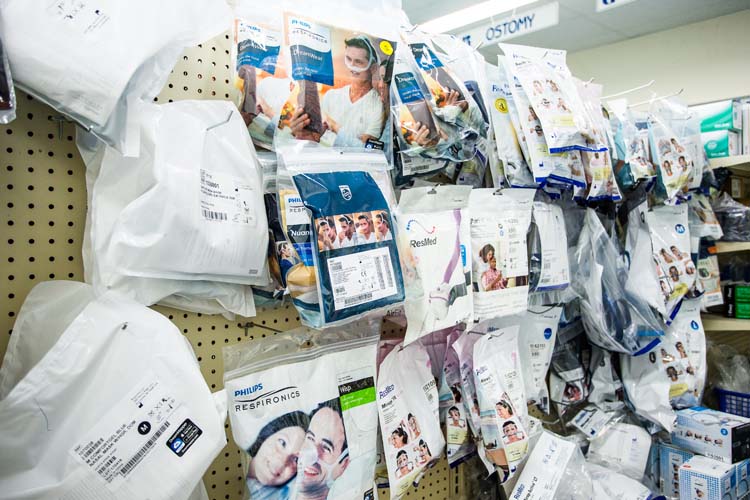Millions of Americans use continuous positive air pressure – or CPAP – machines to combat obstructive sleep apnea.
Far fewer, however, properly perform the essential task of cleaning the tubes, tubs, masks and filters that come with these life-saving devices.
Just ask Mike Misserville at Vero Beach’s Perkins Medical Supply on 10th Court.
After nearly 16 years of helping sleep apnea patients get the most out of their CPAP therapy, Misserville has seen just about every wrong way people attempt to clean their equipment. And it’s not just first-time users, either.

That’s actually fine by Misserville, because, as he puts it, “we’re here to help the public. We’re here for people.”
And Phillips Respironics, one of the leading manufacturers of CPAP devices, says a great many people need that help. Phillips calls the proper cleaning of CPAP supplies “absolutely essential” and “vitally important” but adds it’s often overlooked.
The Sleep Apnea Center of America gets more graphic. It points out that CPAP hoses, tubing, humidifier tubs and masks are “prime breeding grounds for a wide variety of bacteria and mold.”
The last thing anyone needs is mold or bacteria finding their way into the lungs.
Obstructive sleep apnea is “a serious sleep disorder [that] causes breathing to repeatedly stop and start during sleep,” according to the Mayo Clinic.
It can lead to a host of problems including “coronary artery disease, heart attack, heart failure and stroke” along with “memory problems, mood swings and depression,” and if mold spores or bacteria find their way into the bronchioles and alveoli inside the lungs, things can get worse. Fast.
Turning to the doctor who prescribed your CPAP machine for advice on how to maintain it properly may not be much help.
In many cases those physicians have never used – let alone attempted to clean – the various components of a CPAP machine. They simply “farm out” the process of shipping these devices and accessories to medical warehouse operations like Apria Healthcare.
Because preventing the growth of bacteria and mold is so important, many people automatically reach for anti-bacterial soaps. That, Misserville says, is a bad call because, as he says, the soap “starts to eat away” the structural and chemical integrity of the various components.
Fortunately there is an easy way to keep your CPAP equipment safe and clean – simply clean the face mask every morning with a mild, non-anti-bacterial soap like Ivory. Change the CPAP machine’s air filter at least every 30 days and rinse out the humidifier tub daily with the same Ivory soap and water, shake out the excess and leave it out of the sunlight to air-dry. A water and vinegar solution can also be used.
Misserville also recommends cleaning the tubing every week with either a vinegar and water solution or soap and water; but never even think about using bleach to clean your CPAP supplies. Misserville says he’s had customers who turned to Clorox and promptly regretted it.
“When you use the mild soap,” says Misserville, “it’s killing about 75 percent of germs. When you use the vinegar and water, it’s going to kill about 80 percent of bacteria and germs.”
If you’ve got a spare $327 or so to spend, you can kill 99.9 percent of those bacteria and germs with an automated sterilizer called a “SoClean” device which attaches to your CPAP and cleans the mask, tubing, humidifier tub as well as the rest of the machine. The SoClean, however, is not covered by Medicare.
There are also other solutions to keeping the equip germ-free, including one that would have played well on the acclaimed 2007-2015 AMC TV series “Mad Men.”
A wry smile instantly crosses Misserville’s face when he says, “I did have a patient who used Scotch. And that does work.”
Whether bonded or blended, Misserville maintains, Scotch “will kill about 95 percent of bacteria and you’ll get the smell of the scotch all night,” he adds, rolling his eyes, “and that might just put you to sleep quicker.”
For more detailed information on cleaning your CPAP machine and accessories, Misserville invites people to visit any Perkins Medical Supply store or to call him at 772-569-3798 and come in for a consultation.

